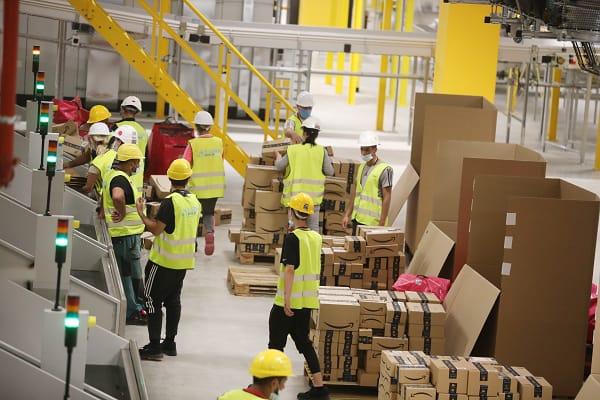Amazon’s most recent quarter profit announcement smashed expectations leading to its stock soaring by 15%. It is a trend showing no sign of slowing.
Amazon is predicting a strong start to 2022, with Q1 sales expected to be between $112.0 billion and $117.0 billion, or to grow between 3% and 8% compared with first quarter 2021. While other pandemic success stories such as Peloton have proved more short lived, Amazon’s smile continues to grow wider.
However, should we really applaud the e-commerce retailer’s extraordinary success which bucks all the trends? It is a value extraction business that impacts retailers and also our local communities. Indeed when you look under the bonnet, it provides questionable value to its addicted users and their communities.
It is time to take action to shift the balance and restore the High Street retail to its rightful place at the heart of our local communities.
Amazon’s glorious pandemic
On a surface level, the success of Amazon makes you feel that there is something not quite right. When an organisation claims a 100% increase in profit in just two years, you have to question how this has happened and who has lost out as a result.
During the pandemic, Amazon took full advantage of the fact that there were thousands of small businesses and multiples out there that couldn’t trade and swooped in. They got into the psyche of individuals as the de facto option and made them become Amazon shoppers. Many who had resisted up until then to become customers for the first time.
Of apart from jobs, what have they brought back to society? As Anita Roddick memorably said: ‘There is no more powerful institution in society than business. The business of business should not be about money, it should be about responsibility. It should be about public good, not private greed.”
Amazon’s tax reality
A key part of a role in any society is paying your way – to support the infrastructure and livelihoods that support people’s lives and the local economy. Amazon pays the tax it is legally entitled to pay. But for a business with a £22billion turnover, it should really be paying more. In fact it is only paying a fraction of what it generates in the UK to the detriment of all. Imagine M&S, Next, John Lewis, Tesco etc not paying the whole tax they should on all revenues earned in the UK. They wouldn’t get away with it and neither should Amazon.
Amazon is not only depriving community retailers of customers but also profits. This further impacts the public purse as failed businesses don’t pay tax. As the New Economics Foundation has reported – a ‘higher proportion of money re-spent in the local economy means a higher multiplier effect because more income is generated for local people. More income retained locally, or nationally, means more jobs, higher pay and more tax revenue for government, all of which may lead to better living standards.’
Green hogwash
We also see soft focus ads where we get to meet the sustainability experts who are helping Amazon towards its net zero obligations. Yet in July last year ITV went undercover in an Amazon warehouse facility and discovered that one facility in Scotland marks more than 130,000 items a week for destruction. This was despite the e-commerce retailer saying that the waste facility that it is sending unsold items to has a recycling center there and nothing goes into the landfill.
We also know that often two items that were ordered at the same time come on separate shipments in two different packages. Meanwhile deliveries that come to the same street that perhaps were ordered on the same day come in multiple vans at different times during the day. All detrimental to the micro and macro environment.
So looking at the real cost of Amazon, what can be done to stem the tide and reinvigorate our High Streets?
Reframe the debate: What is the cost of convenience?
Of course it is a given that Amazon is convenient. But we need to understand the cost of this convenience that are feeding this big hammer. People need to start pulling back from it.
The rise of more conscious consumption will be a trend that might make a difference. A recent study by Deloitte found that environmental awareness amongst UK consumers has surged in the past year with 85% now making more sustainable lifestyle choices.
We also need to reframe the debate. It is not just why Amazon isn’t healthy but looking at the benefits of even returning a fraction of their custom back to local communities. Everyone will say they want a thriving community. But if they continue shopping in this way that community may falter. Consumers should understand that a thriving High Street offers so much more than just products and services – but the glue that binds communities together.
Government action on tax
Government has a critical role in managing the playing field. It is time for Rishi Sunak to get his roller out and level the playing field. Government needs to step in to regulate and certainly enforce local taxes. After all, we know their UK revenues are channeled through Luxembourg. Therefore, they don’t need to pay the full UK tax and they claim that we pay the tax that we pay through National Insurance. In doing this, they don’t pay the full UK tax on UK generated revenues, claiming they pay their fair share through employer’s national insurance, business rates, stamp duty and corporation tax.
A properly implemented online sales tax is long overdue. This is the statutory element through payroll because they have staff employed in the UK, but it has to be done on profit in the same way that a UK business’ profit is taxable.
Profit needs to be taxable as well in the same way that Marks and Spencers profit is taxable, or Tescos or any other retailer. These are British retailers and they work in British commerce, whether it is ecommerce or high street. They don’t have a loophole so why should Amazon?. Amazon shouldn’t be exempt from the same rules that everybody else has to play by. Others are effectively penalised by this, because it stops their growth and their ability to invest.
Retailers need to come together
Retailers also need to more assertive – after all their very survival is at stake. Campaigns to encourage and educate consumers can be hugely beneficial. For example, Amazon’s prices aren’t always cheaper. Highlighting where their prices are better value could be a good way of subverting Amazon’s own approach.
They also need to come together and use their collective power through local chambers of commerce, through local councils and regular meetings with their local MPs who have the power to effect change in policy. After all, MPs are there to represent the interests of their constituents, not American billionaires.
In summary, Amazon’s success should not be celebrated. It has come at a great cost to all of us and action is needed now to save the High Street and the local communities that depend on them. Jeff Bezos may be jetting into space. But what is he burning on the ground below to enable his take off?





Leave a Comment